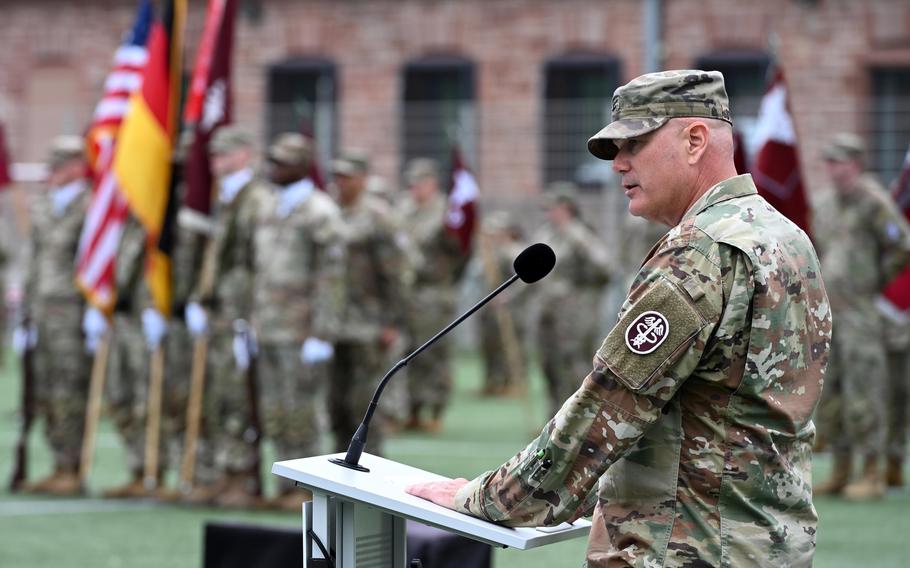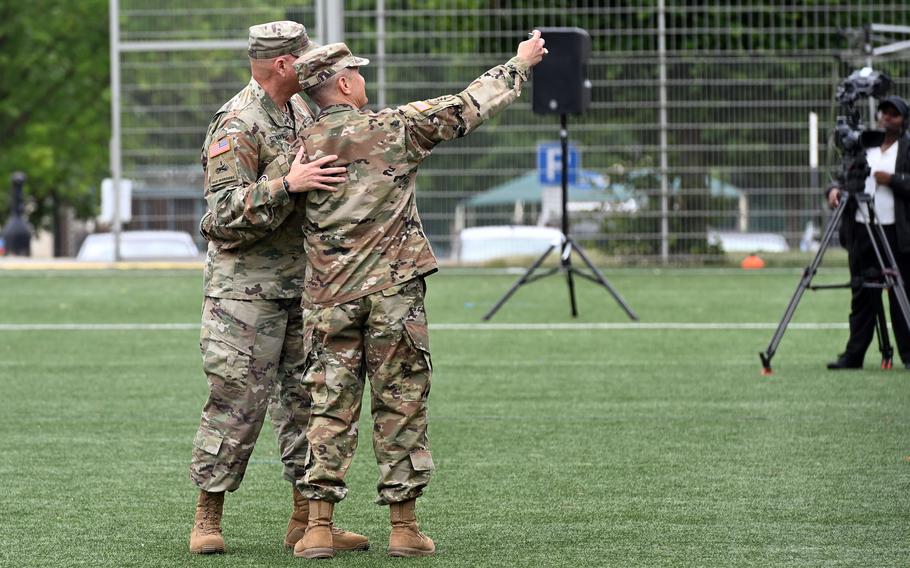
Col. Warren Stewart gives his first speech as commander of Landstuhl Regional Medical Center during a change of command ceremony June 26, 2025, in Landstuhl, Germany. Stewart took the reins from Col. Ted Brown. (Michael Abrams/Stars and Stripes)
LANDSTUHL, Germany — After 35 years in the Army, Col. Warren Stewart wasn’t expecting to make the first overseas move of his military career.
But the former enlisted soldier, who spent three years deployed to Iraq as a trauma nurse, couldn’t turn down the opportunity to command Landstuhl Regional Medical Center.
Many of the wounded Stewart had helped save in the field were treated at LRMC, the Defense Department’s largest overseas hospital.
“The one shiny beacon that was always the constant was Landstuhl,” he said. “We always knew that if we could get a soldier or airman or Marine ... back to Landstuhl, their chances of survival were almost 100%. And that gave us hope.
“And when you’re putting that very injured patient on a helicopter or an aircraft and you’re saying, ‘Hey, your next stop is Landstuhl,’ it gave them hope.”
On Thursday, Stewart became the 37th commander of the storied facility in a ceremony on a wind-blown soccer field at the hospital complex.
He relieved Col. Ted Brown, who oversaw LRMC for two years. Brown is headed a few villages away to become chief of staff for the 68th Theater Medical Command at Sembach.
Stewart comes from Fort Belvoir, Va., where he was the chief of staff for Medical Readiness Command, East.
Using the Pentagon terms for a move outside the continental United States, Stewart said Thursday that for himself and his wife, Lori, “this is the first time we went through the magic that is OCONUS PCS.”
The quip drew laughs from onlookers, who were well-aware of a process that military families say is not for the faint of heart.
Stewart takes command as the hospital prepares to move a few miles away to the $1.6 billion Rhine Ordnance Barracks Medical Center.
Landstuhl Regional Medical Center opened in 1953, part of the huge U.S. military presence in Europe after World War II and through the end of the Cold War.
The pace of operations has eased some since the wars in Iraq and Afghanistan, when more than 95,000 wounded troops were treated at the hospital, with a 99% survival rate, according to the Army.
The medical center has continued to play a role in the ongoing Russia-Ukraine war. During Brown’s tenure, it cared for 51 members of the Ukrainian armed forces injured in the conflict, said Brig. Gen. Roger Giraud, the commander of U.S. Army Medical Readiness Command Europe.

The outgoing commander of Landstuhl Regional Medical Center, Col. Ted Brown, right, takes a selfie with incoming commander Col. Warren Stewart during the change of command ceremony June 26, 2025, in Landstuhl, Germany. (Michael Abrams/Stars and Stripes)
LRMC personnel so far this year have trained more than 200 Ukrainian combat medics in Germany and the United Kingdom, “doing a small part to enable Ukraine to buy the (NATO) alliance time,” Giraud said.
Giraud also noted that Brown oversaw LRMC’s smooth transition in 2023 to Military Healthcare System Genesis, the Pentagon’s electronic medical record system.
Rolled out across the Defense Department starting in 2017, the program is still experiencing lower user satisfaction than its predecessor, according to a 2024 Government Accountability Office report.